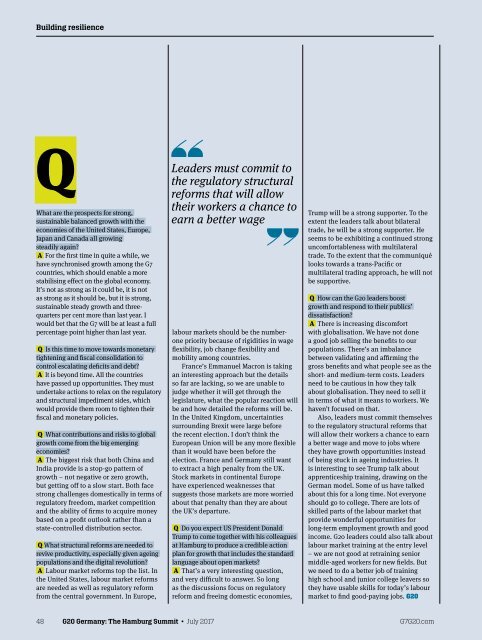G20-Germany-Hamburg-2017
mo.rami@trmg.co.uk
mo.rami@trmg.co.uk
You also want an ePaper? Increase the reach of your titles
YUMPU automatically turns print PDFs into web optimized ePapers that Google loves.
Building resilience<br />
Q<br />
What are the prospects for strong,<br />
sustainable balanced growth with the<br />
economies of the United States, Europe,<br />
Japan and Canada all growing<br />
steadily again?<br />
A For the first time in quite a while, we<br />
have synchronised growth among the G7<br />
countries, which should enable a more<br />
stabilising effect on the global economy.<br />
It’s not as strong as it could be, it is not<br />
as strong as it should be, but it is strong,<br />
sustainable steady growth and threequarters<br />
per cent more than last year. I<br />
would bet that the G7 will be at least a full<br />
percentage point higher than last year.<br />
Q Is this time to move towards monetary<br />
tightening and fiscal consolidation to<br />
control escalating deficits and debt?<br />
A It is beyond time. All the countries<br />
have passed up opportunities. They must<br />
undertake actions to relax on the regulatory<br />
and structural impediment sides, which<br />
would provide them room to tighten their<br />
fiscal and monetary policies.<br />
Q What contributions and risks to global<br />
growth come from the big emerging<br />
economies?<br />
A The biggest risk that both China and<br />
India provide is a stop-go pattern of<br />
growth – not negative or zero growth,<br />
but getting off to a slow start. Both face<br />
strong challenges domestically in terms of<br />
regulatory freedom, market competition<br />
and the ability of firms to acquire money<br />
based on a profit outlook rather than a<br />
state-controlled distribution sector.<br />
Q What structural reforms are needed to<br />
revive productivity, especially given ageing<br />
populations and the digital revolution?<br />
A Labour market reforms top the list. In<br />
the United States, labour market reforms<br />
are needed as well as regulatory reform<br />
from the central government. In Europe,<br />
Leaders must commit to<br />
the regulatory structural<br />
reforms that will allow<br />
their workers a chance to<br />
earn a better wage<br />
labour markets should be the numberone<br />
priority because of rigidities in wage<br />
flexibility, job change flexibility and<br />
mobility among countries.<br />
France’s Emmanuel Macron is taking<br />
an interesting approach but the details<br />
so far are lacking, so we are unable to<br />
judge whether it will get through the<br />
legislature, what the popular reaction will<br />
be and how detailed the reforms will be.<br />
In the United Kingdom, uncertainties<br />
surrounding Brexit were large before<br />
the recent election. I don’t think the<br />
European Union will be any more flexible<br />
than it would have been before the<br />
election. France and <strong>Germany</strong> still want<br />
to extract a high penalty from the UK.<br />
Stock markets in continental Europe<br />
have experienced weaknesses that<br />
suggests those markets are more worried<br />
about that penalty than they are about<br />
the UK’s departure.<br />
Q Do you expect US President Donald<br />
Trump to come together with his colleagues<br />
at <strong>Hamburg</strong> to produce a credible action<br />
plan for growth that includes the standard<br />
language about open markets?<br />
A That’s a very interesting question,<br />
and very difficult to answer. So long<br />
as the discussions focus on regulatory<br />
reform and freeing domestic economies,<br />
Trump will be a strong supporter. To the<br />
extent the leaders talk about bilateral<br />
trade, he will be a strong supporter. He<br />
seems to be exhibiting a continued strong<br />
uncomfortableness with multilateral<br />
trade. To the extent that the communiqué<br />
looks towards a trans-Pacific or<br />
multilateral trading approach, he will not<br />
be supportive.<br />
Q How can the <strong>G20</strong> leaders boost<br />
growth and respond to their publics’<br />
dissatisfaction?<br />
A There is increasing discomfort<br />
with globalisation. We have not done<br />
a good job selling the benefits to our<br />
populations. There’s an imbalance<br />
between validating and affirming the<br />
gross benefits and what people see as the<br />
short- and medium-term costs. Leaders<br />
need to be cautious in how they talk<br />
about globalisation. They need to sell it<br />
in terms of what it means to workers. We<br />
haven’t focused on that.<br />
Also, leaders must commit themselves<br />
to the regulatory structural reforms that<br />
will allow their workers a chance to earn<br />
a better wage and move to jobs where<br />
they have growth opportunities instead<br />
of being stuck in ageing industries. It<br />
is interesting to see Trump talk about<br />
apprenticeship training, drawing on the<br />
German model. Some of us have talked<br />
about this for a long time. Not everyone<br />
should go to college. There are lots of<br />
skilled parts of the labour market that<br />
provide wonderful opportunities for<br />
long-term employment growth and good<br />
income. <strong>G20</strong> leaders could also talk about<br />
labour market training at the entry level<br />
– we are not good at retraining senior<br />
middle-aged workers for new fields. But<br />
we need to do a better job of training<br />
high school and junior college leavers so<br />
they have usable skills for today’s labour<br />
market to find good-paying jobs. <strong>G20</strong><br />
48 <strong>G20</strong> <strong>Germany</strong>: The <strong>Hamburg</strong> Summit • July <strong>2017</strong> G7<strong>G20</strong>.com
















